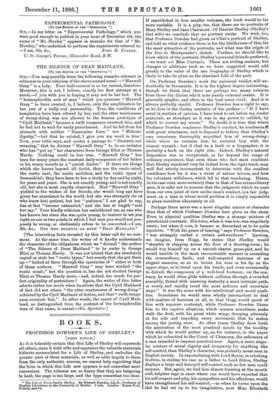THE SILENCE OF DEAN MArTLA_ND.
[To THE EDITOR OF THE " SPECFATOR."1 SIB.,—Yon may possibly deem the following remarks relevant in reference to your criticism of the above-named novel :—" Maxwell Gray" is a lady. Your half-surmise is so far correct, therefore. Moreover, this is not, I believe, exactly her first attempt at a novel,—I join with you in hoping it may not be her last. The hermaphrodite sort of man" which you presume "Maxwell Gray" to have created, is, I believe, only the amplification by her pen of a sadly real personality. True, the conditions of temptation have been altered by her, and the utter wantonness of wrong-doing was not allowed to the human prototype of -" Cyril Maitland," because a swift vengeance overtook him, and he had not to wait for tardy punishment. And he fell from his pinnacle with neither " Samsonian force " nor " Miltonic dignity,"—but that he existed, I give you my word is true ! Now, your critic says, and quotes a passage to "illustrate our meaning," that he divines "Maxwell Gray" to be an imitator who has "got up" her characters from George Eliot or Thomas Hardy. Nothing could be less true. "Maxwell Gray" has been for many years the constant daily companion of her father -in his weary rounds as a "parish doctor." If there are things which she knows beyond all doubt, they are the rustic mind, the rustic cant, the rustic ambition, and the rustic types of humankind ; they have been to her a study by day and by night, for years and years. She is not exactly young, and is not exactly old, but she is most exactly observant. Had "Maxwell Gray" yielded to the wishes of her friends, she would long ago have given her experience to the world, but she was strangely (to us -who knew her) patient, but her "patience," I am glad to say, has at last "become exhausted," and she has at length "said her say." Your kindly criticism has emboldened me, as one who has known her since she was quite young, to venture to set you -right on one or two points in which I feel sure you would not pur- posely be wrong, or obstinately refuse to be converted.—I am, -Sir, &C., ONE WHO BELIEVES HE KNEW "DEAN MAITLAND."
[The interesting facts revealed by this letter call for no corn- saint. At the same time, the writer of it hardly understands -the character of the obligations which we " divined " the author of "The Silence of Dean Maitland" to be under to George Eliot or Thomas Hardy. It was not hinted that she absolutely -copied or stole her "rustic types," but merely that she got them up—" looked at them through the spectacles of" either or both of these authors. "Maxwell Gray" may have studied "the rustic mind ;" but the question is, has she not studied George Eliot or Thomas Hardy more,—and, indeed, too much for per- fect originality of portraiture ? Again, the writer of this letter admits rather too much when he allows that the Cyril Maitland of fact did not attain "the utter wantonness of wrong-doing" achieved by the Cyril Maitland of fiction, and that" swift venge- ance overtook him." In other words, the career of Cyril Mait- land, as distinguished from the portrait of the hermaphrodite _man of that name, is unreal.—En. Spectator.]
















































 Previous page
Previous page